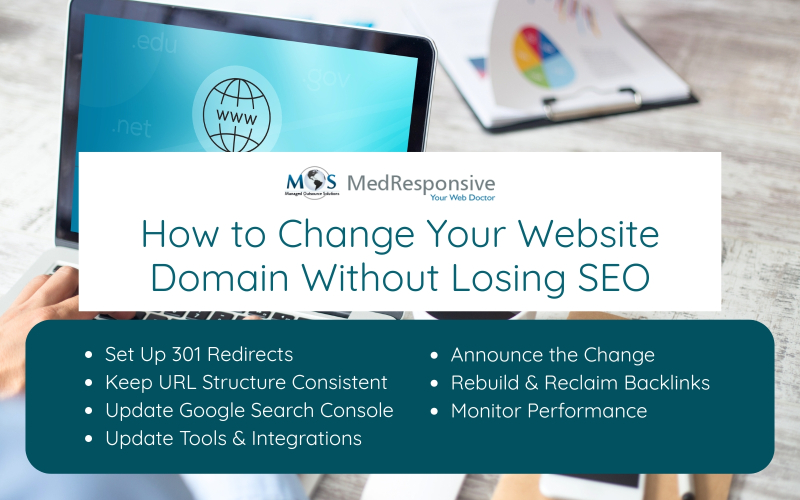Imagine this scenario, where you show up at one of your favorite daily retail stores, only to find a signboard that says, “We’ve Moved” but without a forwarding address. Quite disappointing, yes?
That’s exactly how users and search engines feel when you change your website’s domain name, especially without following a solid changing website domain name SEO plan. And, apart from leaving behind a negative impression, it also takes a big hit on your SEO as well.
In an exponentially competitive digital environment, something as harmless as changing your website domain could knock down the fortress of reputation and customer base, which took years to build and establish. With billions of searches happening every day, this could mean your website instantly disappearing from the eyeballs of your existing and potential customers.
However, a move like this is inevitable—especially when businesses are going through merging or rebranding or just consolidating multiple domains. Even though it can feel like hitting the reset button, implementing a domain name change SEO strategy can ease this transition.
So, before you make the leap, figure out how to make that transition without having to drop your hard-earned rankings in this post.
Why Change a Domain Name?
A pretty obvious question—why would a business risk their SEO juice? Well, there are a bunch of legit reasons why a business might want to change its domain name:
- Rebranding: Stakeholders may want to change the old name that doesn’t match the evolved business.
- Mergers & Acquisitions: Combining sites or businesses, under a unified domain name for coherence.
- Keyword Strategy: The current domain doesn’t exactly reflect the niche the business represents now.
- Optimizing URL: Shorter, catchier, easier-to-remember domains are marketing gold as they could increase engagement.
Whatever the reason is, just keep this mind: Google doesn’t automatically transfer your SEO rankings to your new domain. You’ve to take the initiative to make that happen.
Does Changing Your Domain Affect SEO rankings?
As explained, altering a domain name is akin to ripping a band-aid off, and that means, it can hurt your SEO if not done properly. Let’s see how:
- Temporary Traffic Dips
Even with the smoothest transition, Google will require some time to crawl, re-index, and gain trust in your new domain. Therefore, a dip in traffic can be expected for a few weeks, sometimes months.
- Backlinks May Get Lost
Your old domain likely had a lot of precious backlinks. This link equity is crucial in SEO after changing domain and needs careful management. If those backlinks that are pointing to your old domain aren’t redirected correctly, all that precious link juice will go down the drain.
- Crawl Errors
If your new website has broken internal links, missing pages, and unoptimized redirects, it can confuse search engines and users alike.
- Duplicate Content Woes
If both domains are live without proper redirection, Google might treat them as duplicates, which can hurt rankings.
But don’t worry; there are ways to keep your SEO strong through the transition.
How to Change a Website Domain Without Losing SEO?
See this as your SEO survival kit for domain migration SEO. Follow these steps, and you’ll make Google (and your users) happy.
- Set Up 301 Redirects (Properly!)
A 301 redirect is your Swiss Knife during a domain change; it’s simple, effective and gets the job done without much fuss. It basically conveys to all search engines that this page has been moved permanently–and most importantly–to this new address.
“Pro tip: Redirect every single page, not just the homepage. That means, /about-us on your old site should redirect to /about-us on your new one.”
- Keep Your URL Structure the Same (If Possible)
Changing your domain has been disruptive enough, and try not to add chaos by also changing all your URLs.
For example, if your old blog post was:
olddomain.com/blog/seo-tips
Then aim to keep it as:
newdomain.com/blog/seo-tips
This consistency helps Google recognize the page and transfer rankings smoothly.
- Update Google Search Console
After the switch:
- Add and verify your new domain in Google Search Console.
- Use the “Change of Address” tool to notify Google officially.
This helps speed up the reindexing process and lets you monitor how your new domain is performing.
- Update All Your Tools & Integrations
Make sure to update your:
- Google Analytics
- Social media links
- Paid ads
- Email footers
- Business directories (Yelp, GMB, etc.)
- Backlink outreach partners
Because, every link counts.
- Announce It Loud and Proud
Changing the domain name and getting the technical peripherals done was one thing. Now, it’s time to let your audience know what’s up. Proactively post on social media, send emails, write a blog and explain why the change is happening and how it benefits them. This keeps your loyal visitors in the loop and reduces confusion.
- Rebuild & Reclaim Backlinks
Backlinks are worth more than it is perceived out there. Reach out to top referring domains and request them to update their links to your new domain. Of course, not everyone will do it, but even a few updates can boost your authority.
- Monitor Everything
Use Google Analytics and Search Console to track:
- Traffic drops or gains
- Crawl errors
- Page indexing
- Keyword performance
The key here is to identify issues early and fix them before they snowball.
Long-Term SEO After a Domain Change
Changing domains isn’t just a one-and-done job. Here’s how to build trust with Google again:
- Keep publishing quality content,
- Speed up your site (performance matters!),
- Get more backlinks—natural and high-quality ones,
- Stay consistent with branding and messaging so users recognize and trust you.
Eventually, Google will understand that your new domain is the real one.
Website Domain Change: Is It Worth the Effort?
Yes, it is, if done right.
If you think your new domain better reflects your brand, improves user experience, and gives you long-term marketing potential, it is worth going through the short-term SEO turbulence.
However, keep in mind that it’s not a DIY weekend project. It requires utmost planning, precision, and a credible understanding of SEO mechanics.
That’s where MedResponsive comes in.
Why Collaborate with MedResponsive for Domain Change and AI SEO Services?
Changing your domain is like uprooting a fully-grown tree and successfully replanting it at the right spot, so it can grow even better than it did before. Through our AI-powered SEO strategies we take the guesswork out of big decisions like domain changes.
Here’s what we bring to the table:
- Smart Redirect Strategies that keep your rankings and authority intact.
- AI-Powered SEO Audits that identifies what humans might miss.
- Real-Time Performance Monitoring post-migration to keep track of site performance.
- Backlink Management to keep your link equity and credibility intact.
- Content Optimization so your pages keep performing at optimum levels.
It doesn’t matter if you’re rebranding or consolidating your online presence, MedResponsive can give your site the edge it deserves so that you don’t have to gamble with your SEO rankings.





